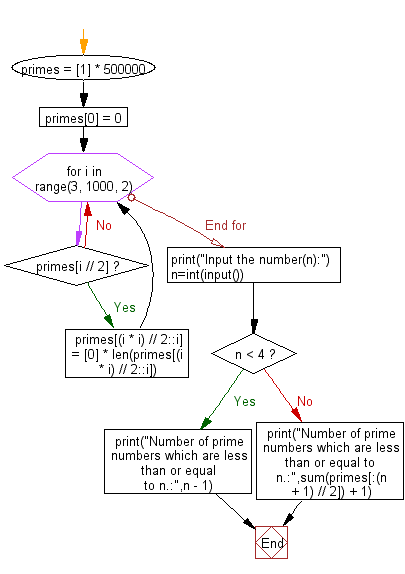Python: Print the number of prime numbers which are less than or equal to a given integer
Count Prime Numbers
Write a Python program to print the number of prime numbers that are less than or equal to a given number.
Input:
n (1 ≤ n ≤ 999,999)
Input the number(n): 35
Number of prime numbers which are less than or equal to n.: 11
Sample Solution:
Python Code:
# Initialize a list to represent prime numbers up to 500000
primes = [1] * 500000
primes[0] = 0 # 0 is not a prime number
# Sieve of Eratosthenes: Mark non-prime numbers in the list
for i in range(3, 1000, 2):
if primes[i // 2]:
primes[(i * i) // 2::i] = [0] * len(primes[(i * i) // 2::i])
# Prompt user to input a number 'n'
print("Input the number(n):")
n = int(input())
# Check and print the number of primes less than or equal to 'n'
if n < 4:
print("Number of prime numbers which are less than or equal to n.:", n - 1)
else:
print("Number of prime numbers which are less than or equal to n.:", sum(primes[:(n + 1) // 2]) + 1)
Sample Output:
Input the number(n): 35 Number of prime numbers which are less than or equal to n.: 11
Explanation:
Here is a breakdown of the above Python code:
- Initialize Prime List:
- primes is initialized as a list of 1s, where the index represents numbers. primes[0] is set to 0 since 0 is not a prime number.
- Sieve of Eratosthenes:
- The code uses the Sieve of Eratosthenes algorithm to mark non-prime numbers in the list. It iterates over odd numbers from 3 to 999 (skipping even numbers) and updates the list to mark multiples of each prime.
- User Input:
- The user is prompted to input a number 'n'.
- Check and Print Prime Count:
- If 'n' is less than 4, it prints n - 1 as the count of prime numbers (excluding 0). Otherwise, it prints the count of prime numbers less than or equal to 'n' using the precomputed 'primes' list.
- Write a Python program to compute the sum of all prime numbers less than or equal to a given number.
- Write a Python program to generate and display a list of all prime numbers up to a specified limit.
- Write a Python program to count the number of twin prime pairs below a given number.
- Write a Python program to find the largest gap between consecutive prime numbers within a given range.
Visual Presentation:
Flowchart:

For more Practice: Solve these Related Problems:
Go to:
Previous: Write a Python program which reads an integer n and find the number of combinations of a,b,c and d (0 ≤ a,b,c,d ≤ 9) where (a + b + c + d) will be equal to n.
Next: Write a program to compute the radius and the central coordinate (x, y) of a circle which is constructed by three given points on the plane surface.
Python Code Editor:
Have another way to solve this solution? Contribute your code (and comments) through Disqus.
What is the difficulty level of this exercise?
Test your Programming skills with w3resource's quiz.
